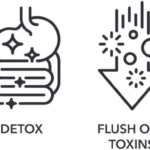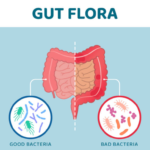
How Does Sleep Affect Gut Health?
Have you ever considered how a bad night’s sleep can impact more than just your energy levels? Many people, including myself, once viewed sleep as merely downtime. However, it’s much more significant than that. Sleep profoundly affects gut health, and understanding this connection can surprisingly reshape our overall well-being.
The relationship between sleep and gut health is interdependent. Poor sleep can disrupt your stomach, leading to cravings for unhealthy foods. Research supports this link, showing that inadequate sleep directly affects gut health.
Lack of sleep also elevates stress levels, which can disturb hormones like cortisol, negatively impacting your gut. Additionally, being tired disrupts hunger hormones, prompting unhealthy food choices that further harm your gut health and sleep.
Fortunately, there’s a silver lining. A balanced gut microbiome can enhance sleep quality and duration. Gut bacteria are crucial in regulating our body clock and sleep patterns. By optimizing sleep and maintaining a healthy diet, you can improve your gut health and overall well-being.
Key Takeaways
- Poor sleep can increase stress and imbalanced hormones, negatively affecting gut health.
- Disrupted hunger hormones due to sleep deprivation lead to unhealthy dietary choices.
- A diverse microbiome positively affects sleep quality and efficiency.
- Circadian rhythms regulated by gut bacteria affect how well we sleep.
- Maintaining a consistent sleep schedule and a diet rich in whole foods can improve gut health and sleep quality.
How Sleep Affects Gut Health: An Introduction
Sleep is more than just a period of rest; it is crucial for our overall health, significantly impacting our gut. The relationship between sleep and gut health is important and bidirectional: good sleep supports gut health, and a healthy gut can improve sleep quality.
The research underscores the significance of sleep duration on our longevity. For instance, inadequate sleep can lead to various health issues. Studies reveal that insufficient sleep can harm our well-being, including gut health.
Poor sleep can disrupt our body clock, negatively affecting gut health. Irregular sleep patterns interfere with the hormones essential for proper gut function. For example, a lack of melatonin can lead to digestive problems like GERD. Conversely, the bacteria in our gut also affect how well we sleep. Research involving 40 men has shown that a diverse gut microbiome is associated with better sleep. This indicates that maintaining a healthy gut can contribute to improved sleep.
According to Henry Ford Health Staff, maintaining a regular sleep and eating schedule is essential. This routine supports both sleep and gut health. Insufficient sleep can increase stress, which may harm our gut bacteria. Moreover, inadequate sleep can contribute to weight gain, illustrating how poor sleep affects metabolism and gut health. Therefore, cultivating good sleep habits is vital for maintaining a healthy gut.
Understanding the link between sleep and gut health is crucial for overall well-being. Balancing sleep with a gut-friendly diet is key to optimizing sleep and gut health, leading to a better quality of life.
| Aspect | Correlation |
|---|---|
| Sleep Duration and Mortality | Strong correlation with overall mortality risk |
| Microbiome Diversity | Positively correlated with sleep efficiency and total sleep time |
| Melatonin Disruption | Linked to gastrointestinal issues like GERD |
| Sleep Debt | Linked to obesity and metabolic issues |
How Sleep Affects Gut Health Through the Gut-Brain Axis
Exploring the close link between our gut and brain helps us understand how sleep affects gut health, feelings, stress, and overall sleep quality. This connection, known as the gut-brain axis, involves various mechanisms crucial to our health. Understanding this interaction sheds light on how our gut and brain influence each other, impacting our sleep and overall well-being.
The Gut-Brain Axis: Connecting Sleep and Gut Health
The gut-brain axis is a two-way communication line between our gut and brain, influencing how sleep affects gut health. This connection operates through our immune system, manages neurotransmitters, and utilizes neural pathways for message exchange. This relationship significantly impacts our mood and stress management. For instance, gut bacteria can alter serotonin levels, a neurotransmitter crucial for mood and sleep regulation. The research highlighted in Trends in Neuroscience demonstrates the axis’s role in managing anxiety and depression, illustrating how intricately our gut health and sleep are linked.
Communication Through the Vagus Nerve
The vagus nerve plays a crucial role in the gut-brain axis, significantly affecting how sleep impacts gut health. This nerve sends signals directly from the gut to the brain, influencing various body functions such as digestion and heart rate. Additionally, it conveys messages that affect mood and stress responses. Research published in the Proceedings of the National Academy of Sciences underscores the importance of a healthy gut in supporting brain development and behavior, highlighting the pivotal role of the vagus nerve in maintaining this crucial connection.
How Sleep Affects Mood, Stress, and Gut Health
Our gut-brain interaction significantly influences our emotions and stress levels. Healthy gut bacteria contribute to positive emotions, while imbalances can increase stress and anxiety. Research published in Gastroenterology highlights how gut bacteria affect brain function and behavior. Poor sleep quality, often related to gut issues, is more than just inconvenient; it is associated with serious health risks, including heart disease and digestive problems.
Incorporating a diverse diet rich in prebiotics and probiotics can enhance mood and manage stress. Understanding the gut-brain axis and the vagus nerve’s role can empower us to manage mental health through gut health better.
The Role of Gut Health in Enhancing Sleep Quality
Role of the Gut Microbiome
Impact of Microbiome Diversity on Sleep
Serotonin and Sleep Regulation
| Gut Bacteria | Sleep Impact |
|---|---|
| Lachnospiraceae UCG004 | Promotes longer sleep |
| Odoribacter | Promotes longer sleep |
| Selenomonadales | Increases risk of insomnia |
| Negativicutes | Increases risk of insomnia |
| Ruminococcus torques | Linked to snoring and prevalent in obesity |
| Senegalimassilia | Decreases the risk of snoring and is prevalent in healthy weight |
The Impact of Poor Sleep on Digestive Health

Increased Risk of Gastrointestinal Issues
Many studies show a link between poor sleep and gut health risks. For instance, a 2009 study found that sleep issues and gastroesophageal reflux disease (GERD) are connected. People with GERD often have trouble sleeping, worsening their gut issues.
Similarly, those with cirrhosis and inflammatory bowel disease (IBD) often have sleep problems. Poor sleep makes IBD conditions worse, increasing gut discomfort. Also, using nasal Continuous Positive Airway Pressure (CPAP) can lessen reflux in those with sleep apnea, showing that better sleep improves gut health.
Influence on Food Choices and Cravings
Not sleeping enough dramatically affects what we eat. Lack of sleep leads to hormonal imbalance, causing cravings for sugary and processed foods. These foods are bad for our gut, leading to weight gain and metabolic problems and upsetting the gut microbiota balance.
Keeping a regular sleep schedule is key for digestive and metabolic health. Getting enough sleep helps control hunger hormones, making us less likely to snack on bad foods. Also, eating fiber-rich foods supports healthy gut bacteria and promotes restful sleep. Good sleep habits are vital for healthy dietary habits and better gut health.
Practical Tips for Improving Sleep and Gut Health
Use practical tips to improve your sleep and gut health. These strategies can make a big difference. They help you sleep better and keep your gut healthy.
Consistent Sleep Schedule
Having a regular sleep schedule is key to better sleep hygiene. Go to bed and wake up at the same time every day. This helps your body keep a consistent internal clock, which improves sleep quality.
Balanced Diet Rich in Fiber and Nutrients
A diet high in fiber is crucial for gut health and sound sleep. Eat plenty of whole grains, fruits, and veggies. These foods support a healthy gut microbiome. A balanced gut can lower the risk of diabetes and inflammatory bowel disease.
Limited Caffeine and Screen Time
Reduce caffeine in the afternoon and evening to avoid sleep problems. Also, cut down on screen time before bed. This means less TV, smartphone, and computer use. It helps you avoid blue light, which can mess with your sleep hormone, melatonin.
Relaxation Techniques Before Bedtime
Try relaxation techniques like deep breathing or meditation before bed. You can also spend time in nature. These activities ease stress, leading to better sleep. They also help your gut by easing stress-related changes in gut bacteria.
| Tip | Benefit |
|---|---|
| Consistent Sleep Schedule | Regulates internal clock, enhances sleep quality |
| Fiber-Rich Diet | Supports gut microbiome diversity, reduces health risks |
| Limited Caffeine and Screen Time | Prevents sleep disturbances, maintains sleep hygiene |
| Relaxation Techniques | Reduces stress, improves sleep and gut health |
The Importance of a Healthy Gut Microbiome for Sleep
A healthy gut leads to better sleep, so it’s key to include healthy gut foods in your diet. Let’s examine how certain foods and diets improve gut balance and sleep.
Foods That Promote a Healthy Gut
Healthy gut foods make a big difference. Eating whole, plant-based foods helps “good” gut bacteria thrive. Fruits, vegetables, nuts, seeds, legumes, and whole grains are tops. They are full of nutrients and fiber for a healthy microbiome.
Prebiotics and Probiotics
These foods are great for gut health. For example, prebiotics, which are found in bananas, onions, and garlic, feed good bacteria. On the other hand, probiotics, the good bacteria found in yogurt, kefir, and some cheeses, help keep the gut balanced. Consequently, they can contribute to better sleep.
Cutting Processed Foods
In addition, avoiding processed foods can significantly improve gut health. These foods often contain additives and lack beneficial fiber and nutrients. Therefore, reducing processed food intake leads to a decrease in “bad” gut bacteria. As a result, this can enhance digestive health and improve sleep quality. ZOE offers personalized nutrition plans to support these changes.
Many studies illustrate the impact of diet on sleep. For instance, the ZOE PREDICT study found that sleep patterns can influence gut bacteria. Moreover, erratic sleep and poor diet choices are frequently linked. However, adopting a balanced diet and maintaining regular sleep can substantially boost gut health and overall well-being.
Conclusion
The relationship between sleep and gut health is complex. Studies indicate that sleep affects our gut and vice versa. Poor sleep can lead to stomach problems, alter our food cravings, and disrupt the gut-brain connection, potentially causing health issues. Conversely, a healthy gut can significantly improve our sleep quality.
Applying scientific discoveries to enhance both sleep and gut health is crucial. For instance, the gut microbiome is key in regulating our sleep cycle through beneficial bacteria. Understanding this connection enables us to explore new methods for improving our well-being. Furthermore, when sleep issues disrupt gut bacteria, it can create a detrimental cycle that hampers our ability to maintain a healthy diet and relax. Therefore, addressing sleep and gut health together can substantially improve our overall quality of life.
FAQ
Q: How does sleep affect gut health, and what can I do to improve it?
A: Good sleep is key for our health, especially our gut. Sleeping well, eating fiber-rich foods, and cutting down on caffeine and screens before bed improves both.
Q: What is the importance of the sleep-gut relationship?
A: Sleep and gut health are closely linked. They affect each other. To feel your best, combine healthy sleep and a gut-friendly diet.
Q: What is the gut-brain axis?
A: The gut-brain axis is how the gut and brain talk to each other. It uses immune signals and neurotransmitters like serotonin. This connection influences our mood, sleep, and how we handle stress.
Q: How does the vagus nerve communicate between the gut and brain?
A: The vagus nerve connects the gut to the brain directly. It sends signals that affect our feelings, stress levels, and sleep by changing neurotransmitters.
Q: How does gut health affect mood and stress levels?
A: A healthy gut makes neurotransmitters like serotonin important for mood and stress. So, keeping your gut healthy can make you feel happier and more relaxed.
Q: How does the gut microbiome influence sleep quality?
A: A diverse gut microbiome is good for sleep. Some gut bacteria help us sleep better, while others make sleeping more difficult.
Q: What is the role of serotonin in sleep regulation?
A: Serotonin helps control our sleep-wake cycle. It is made with help from our gut microbes and plays a big part in how we sleep.
Q: How does sleep deprivation impact digestive health?
A: Not sleeping enough can cause stomach problems like GERD. It messes with our hunger signals and causes cravings. This can lead to eating poorly and hurting our guts.
Q: What practical tips can enhance sleep for better gut health?
A: For better sleep and a happy gut, keep a regular sleep schedule. Eat foods high in fiber, limit caffeine and screen time, and try relaxing before bed.
Q: What foods promote a healthy gut?
A: Eating many plants like fruits, veggies, nuts, seeds, and grains is great for the gut. Fermented foods, such as yogurt and kefir, also support good gut bacteria.
Q: What are prebiotics and probiotics, and how do they benefit gut health?
A: Prebiotics are fibers that our good gut bacteria eat, while probiotics are these good bacteria. Both are important for a healthy gut.
Q: Why should I avoid processed foods for better gut health?
A: Processed foods have stuff that’s bad for our guts, like unhealthy fats and sugars. Not eating them helps our gut health and may improve our sleep.
Source Links
Research and Protocols
- Examining the Relationships Between Sleep Physiology and the Gut Microbiome in Preclinical and Translational Research: Protocol for a Scoping Review
- Gut microbiome diversity is associated with sleep physiology in humans
- The Role of Gut Microbiome in Sleep Quality and Health: Dietary Strategies for Microbiota Support
- Frontiers | Associations between gut microbiota and sleep: a two-sample, bidirectional Mendelian randomization study
Impact of Sleep on Gut Health
- How Lack Of Sleep Can Affect Gut Health
- Sleep Dysfunction and Gastrointestinal Diseases
- New Study Shows What’s in Your Gut Influences How and When You Sleep | Sleep Foundation
- How does Sleep Deprivation Affect our Digestive System?
- Poor sleep quality was associated with PLC | NSS
Impact of Gut Health on Sleep
- How Gut Health Impacts Sleep (And Vice Versa)
- How Gut Health and Sleep Affect Each Other
- The Connection Between Sleep and Gut Health | Sleepopolis
- Gut health, probiotics and sleep: all you need to know
Practical Tips and Strategies
- How to Improve and Reset Gut Health
- Tips for Nurturing Gut Health Through Effective Nighttime Routines
- Maintaining regular sleep patterns may improve gut health
- Exercise Interventions Improved Sleep Quality through Regulating Intestinal Microbiota Composition
Influence of Gut Microbiota
Belli Health
Thank you kindly for your feedback. I like addressing unique topics like these posts to readers. If it’s interesting enough to peak my interest, I hope it will be interesting enough for others.
Belli Health
Thank you for your feedback and support. It helps me know posts bring value to the readers.













































4 comments